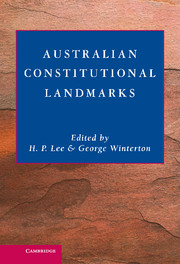Book contents
- Frontmatter
- Contents
- List of Cases
- List of Commonwealth Constitution Provisions
- List of Statutes
- List of Contributors
- Preface
- Introduction: The Commonwealth's Constitutional Century
- 1 The Emergence of the Commonwealth Constitution
- 2 The Engineers Case
- 3 The Uniform Income Tax Cases
- 4 The Bank Nationalisation Cases: The Defeat of Labor's Most Controversial Economic Initiative
- 5 The Communist Party Case
- 6 Fitzpatrick and Browne: Imprisonment by a House of Parliament
- 7 The Boilermakers Case
- 8 The Race Power: A Constitutional Chimera
- 9 The Double Dissolution Cases
- 10 1975: The Dismissal of the Whitlam Government
- 11 The Tasmanian Dam Case
- 12 The Murphy Affair in Retrospect
- 13 The Privy Council and the Constitution
- 14 Cole v Whitfield: ‘Absolutely Free’ Trade?
- 15 The ‘Labour Relations Power’ in the Constitution and Public Sector Employees
- 16 The Implied Freedom of Political Communication
- Index
6 - Fitzpatrick and Browne: Imprisonment by a House of Parliament
Published online by Cambridge University Press: 07 October 2011
- Frontmatter
- Contents
- List of Cases
- List of Commonwealth Constitution Provisions
- List of Statutes
- List of Contributors
- Preface
- Introduction: The Commonwealth's Constitutional Century
- 1 The Emergence of the Commonwealth Constitution
- 2 The Engineers Case
- 3 The Uniform Income Tax Cases
- 4 The Bank Nationalisation Cases: The Defeat of Labor's Most Controversial Economic Initiative
- 5 The Communist Party Case
- 6 Fitzpatrick and Browne: Imprisonment by a House of Parliament
- 7 The Boilermakers Case
- 8 The Race Power: A Constitutional Chimera
- 9 The Double Dissolution Cases
- 10 1975: The Dismissal of the Whitlam Government
- 11 The Tasmanian Dam Case
- 12 The Murphy Affair in Retrospect
- 13 The Privy Council and the Constitution
- 14 Cole v Whitfield: ‘Absolutely Free’ Trade?
- 15 The ‘Labour Relations Power’ in the Constitution and Public Sector Employees
- 16 The Implied Freedom of Political Communication
- Index
Summary
A leading constitutional case and a cause célèbre arose in 1955 from the decision of the House of Representatives to imprison a newspaper owner and a journalist for a contempt of the House. Many people thereby discovered that citizens could be imprisoned not only after trial by a court but by a House of Parliament, a fact not generally known and alarming to some. Since that time it has again become a little-known fact, because no other such occasion has arisen, but a fact (or rather, a law) it remains.
The constitutional basis
Section 49 of the Constitution provides:
The powers, privileges, and immunities of the Senate and of the House of Representatives, and of the members and the committees of each House, shall be such as are declared by the Parliament, and until declared shall be those of the Commons House of Parliament of the United Kingdom, and of its members and committees, at the establishment of the Commonwealth.
The effect of this provision is to attach to the two Houses of the Commonwealth Parliament several powers and immunities recognised by the common and statute law of the United Kingdom and long regarded as part of the defining equipment of the legislature of a self-governing jurisdiction.
One of the powers attracted by this provision is the power of a House to take into custody and imprison any person adjudged by the House to be guilty of a contempt of the House.
- Type
- Chapter
- Information
- Australian Constitutional Landmarks , pp. 145 - 159Publisher: Cambridge University PressPrint publication year: 2003
- 2
- Cited by



